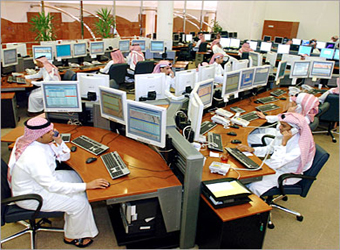A major outcome of the preparatory meetings of the Arab private and public sectors (APSF-2013) is the launch of the Arab Common Exchange (ACE) announced on the opening day of the forum on Sunday.
The ACE will be the first Arab joint capital market representing Arab joint stock companies with Bahrain as its headquarters. It will be manned by the private sector in Arab countries.
The announcement was made jointly by Bahrain’s ambassador to Riyadh, Sheikh Hamood bin Abdullah bin Hamad Al-Khalifa, and the project founder, Safar bin Aed Al-Harthi, who is leading a group of Arab businessmen to this forum.
In an interview with CNBC Arabia TV, Aed Al-Harthi, said the ACE will have overall investments worth $3 trillion and will likely kick off by mid-2014.
The preparatory meeting was held under the theme “Towards Active Participation of Private Sectors in Development and Arab Economic Cooperation Initiatives.” The event was organized by the Council of Saudi Chambers (CSC), General Union of Chambers of Commerce, Industry and Agriculture for Arab Countries (GUCCIA), and the General Secretariat of the Arab League.
Outlining the funding program for the project, Al-Harthi said that the expected volume of investment in ACE by the end of 2028 would soar to about $3 trillion, to be divided among all Arab countries. The project is expected to create 3 million jobs.
In his opening remarks, CSC President Abdullah bin Saeed Al-Mubti estimated the Gross National Product (GNP) of Arab states at around $2 trillion, in addition to oil and gas revenues, which account for 59 percent and 29 percent, respectively, of the Arab world’s GNP.
“But with all these strong economic fundamentals and despite the long Arab joint economic work, the inter-Arab trade represents only a small percentage of the GNP and does not reflect the aspirations of the people,” he observed.
He said this represented only 12.1 percent of the inter-Arab total trade with other countries, while the European community has achieved approximately 70 percent. Also, the share of Arabs countries in terms of foreign direct investments (FDI) is still very limited. This has a negative impact on the standard of living and the employment market in many Arab states. Besides, it has compounded the challenges facing the region, both economically and socially.
“Therefore, the Arab world has to strengthen cooperation to overcome the obstacles that affect the flow of goods and capital among themselves. This can be done by encouraging the private sector and providing support, since it is the main partner of the governments in the economic and social development,” Al-Mubti said, citing indications that show that the private sector in Arab countries contributes more than 50 percent of the GNP.
Spelling out some of the major obstacles that affect the growth of inter-Arab trade, Minister of Commerce and Industry Tawfiq Al-Rabiah identified three major factors, lack of a strong transportation network among the Arab states from the point of origin (producers) to the markets being one of them.
This is in addition to the lack of a regulatory mechanism to ensure the diversification of production base and prevent duplication of the same products entering the market despite diversity in the Arab economies. These factors have been responsible for reducing trade opportunities in the Arab countries. Adding to the problem is the weak enforcement of rules and regulations, which prevent trade liberalization between the Arab countries and the non-application of the IT regime among these countries.
Al-Rabiah added: “However, significant efforts have been made over the past years, both by the Arab League and its various committees, through meetings, conferences and workshops intended to overcome these obstacles and improve the volume of trade between the countries, which resulted in outstanding results. What is required is a follow-up on the recommendations and their implementation.”
He said the countries looked forward to working together for the development of trade between them in terms of quantity and quality control, as the current level was not up to their expectation.
He stressed the need for coordination between businessmen prior to organizing exhibitions for promoting inter-Arab trade under a phased program.
The minister continued: “I would mention also the leading role expected from the Arab private sector organizations in the launch of constructive initiatives by taking advantage of the incentives available for the establishment of productive and service projects that would support the overall official economic efforts to serve the common interests of the Arab nation.”
He recalled the gradual application of the Arab free trade zone that began in 1998, pointing out that by 2005 all taxes and customs duties between the members of Arab Free Trade Zone had been abolished.
However, despite the agreements and efforts to unify the legislative and institutional framework within the Arab League, growth in inter-Arab trade is still small and did not reach 12 percent of the total Arab trade. This shows that the problem is not related to customs duties and taxes. It is a serious issue and needs further diagnosis, Al-Rabiah concluded.



